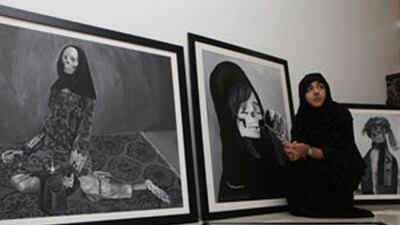DUBAI // In one image, an elderly woman dressed in a jalabiya sits ready to serve tea. In another, a young woman, with heavy eyeliner and her hair piled up under her scarf, chats on a BlackBerry. A third shows a young boy with a UAE scarf making a "peace" gesture.
As depictions of Emiratis, the paintings are unremarkable but for one detail: they are all skeletons. "I wanted to focus on the inside and remind everyone of just how similar we all are in the end," said the creator of these images, Maisoon al Saleh. Each acrylic painting was inspired by people in her life, she said: the young woman is a college friend, and the young boy a friend who crashed his car on national day. "I leave it to the viewer to make their own conclusions about the stories behind these faceless Emirati people."
At 22, al Saleh is already planning her first solo exhibition this summer, in the Maraya Art Centre in Sharjah. She is currently in talks to put on a show in Italy. She is also taking part in this week's custom toys exhibition at the Dubai International Financial Centre as one of the 100 artists who have each put their individual touches to a 20cm-high white figurine. Hers, naturally, is a skeleton. It will wear traditional head wear, the ghutra, as well as headphones and will dance the traditional yola dance with a stick.
Al Saleh said her fascination with bones began when she was 16 and went to hospital for an X-ray of her back. "I looked at that skeleton and said to myself, there lies the skeleton of an Emirati girl," she said. She went home and began to paint skeletons of humans and animals. Since then, her works have included a skeletal camel walking in the desert, and the bones of a middle-aged Emirati man glued to the television.
When people first see her paintings, she said, "they are taken aback, but soon they realise the humour and the universality of what they see, and laugh at it. People are both frightened and fascinated by death." Nicknamed Reddish, for the red hoodies she wears while painting, al Saleh will graduate next month from Zayed University in Dubai with a degree in interior design. She studied the art of Picasso in her teenage years, and later the works of the Emirati artist Abdul Qader al Rais.
Her latest piece, completed last month, is of a sorrowful mother, covered in black abaya and scarf, clutching her infant. It was inspired by stories of mothers in war zones. "I carefully studied the anatomy of bones and skeletons to capture the age of the skeletons, but something inside of me helped me bring out the emotions of the characters in my paintings," she said. With slight alternations around the eye sockets and jaw bones, al Saleh was able to show the hunger of a young Emirati woman on a diet, eating a single piece of chicken.
"There is a growing eating disorder among young women," she said. "They try to look like the celebrities they read about and start harsh diets that cause them to faint and get ill." She recalled a friend who passed out in front of her father after weeks of starving herself into a smaller clothing size. "I can comment on all aspects of our lives through these paintings without identifying or singling a particular person out," she said.
She recently sold one of her works - a diptych called The Couple - to the Barjeel Art Foundation in Sharjah. One of her first sales, it depicts a male and a female skeleton dressed in traditional wedding attire - the groom in a khandoura and ceremonial cloak, the bishet, and his bride in an embroidered white dress. They were based on a real couple, who were together until death separated them. "There is no escaping death. We are all equal in its eyes, where it doesn't judge the exterior and couldn't care less about our race, class, or age," she said.
"When death comes, we all end up looking like this." rghazal@thenational.ae

